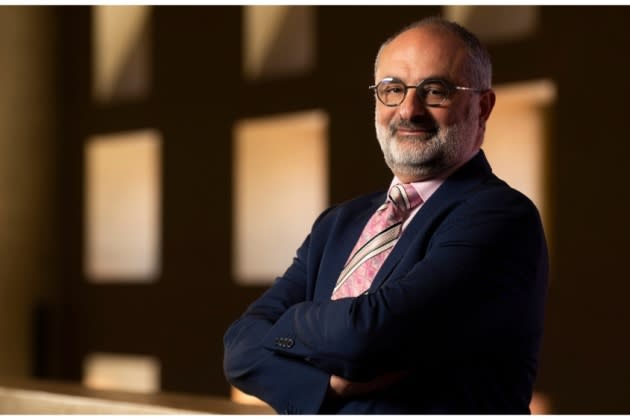Locarno Film Festival Chief Talks Lineup’s Political Themes: ‘You Don’t Make Revolutions With Films,’ but ‘You Can Address Things That Don’t Work’
- Oops!Something went wrong.Please try again later.
- Oops!Something went wrong.Please try again later.

For his third edition at the helm, Locarno Film Festival artistic director Giona A. Nazzaro has assembled a wide spectrum of films that “do not resemble each other in terms of tone or form” while reflecting “the world in all its expressions and manifestations,” he tells Variety.
This boundless range is best exemplified by the fact that starkly surrealist Filipino arthouse star Lav Díaz’s latest work, “Essential Truths of the Lake,” will be vying for the fest’s Golden Leopard alongside fare that, at least on paper, appears much lighter. This includes U.S. director Bob Byington’s indie comedy “Lousy Carter” and Estonian helmer Rainer Sarnet’s “The Invisible Flight,” which Nazzaro says “mixes Kung Fu, hard rock and the Orthodox Church.”
More from Variety
Locarno Titles 'Family Portrait,' 'Dreaming & Dying' Boarded by Lights On (EXCLUSIVE)
Riz Ahmed to Be Honored by Locarno Film Festival, Where His Latest Short 'Dammi' Will Bow
There are also lots of titles at Locarno that can broadly be described as “political,” like Ukrainian director Maryna Vroda’s “Stepne” — which marks a rare case of a new film from war-torn Ukraine — and the fest’s closer, Iranian-Australian director Noora Niasari’s debut film “Shayda,” which will be making its European bow with star Zar Amir Ebrahimi and executive producer Cate Blanchett in tow.
Below, Nazzaro spoke to Variety about his ongoing quest to mix things up.
Talk to me about the opener, Fiona Gordon and Dominique Abel’s “The Falling Star.” All I know is that it’s about a former activist who’s been a fugitive for 35 years, and works as a bartender. Last year you opened with a frothy Hollywood movie, “Bullet Train.” This seems like a bolder choice.
I was super happy and super proud to open last year with “Bullet Train.” And I am just as delighted this year to open with something completely unexpected, and that is “Falling Star.” What I really wish for people coming to the festival is to expect the unexpected.
Without spoilers, can you tell me a bit more about “Falling Star”?
I think it should be experienced. But for those who know the work of Gordon and Abel [they made a splash with “Lost in Paris” which premiered at Telluride in 2016], it’s this surrealistic lunar humor that emerges. Think Buster Keaton and Jaques Tati and Aki Kaurismäki and these oddball characters that are portrayed in an extremely charming and endearing way. We thought this could totally work for the Piazza Grande audience.
In your opening statement, you underline how “while recent events certainly do not leave much room for optimism,” cinema can help tell us the state of the world. I’ve noticed lots of political films at the fest this year.
You don’t make revolutions with films. You cannot expect to change the world with films or with songs, for that matter. But what you can consciously try to do is address some of the things that do not work. “Political” is a word that needs to be intended in very broad terms. It’s not in the sense of party loyalties.
Political can be a film such as Justine Triet’s [Cannes Palme d’Or winner] “Anatomy of a Fall,” or [Italian director] Laura Luchetti’s “La Bella Estate,” based on the Cesare Pavese novel set at the outset of Fascism in Italy; or a doc such as “March of the Penguins” director Luc Jacquet’s “Continent Magnétique” about Antartica. All of which are playing on the Piazza Grande. What we really try to do is ask questions that can ignite more meaningful conversations.
Aside from “Shayda,” you also have another Iranian film in competition, “Critical Zone” by Ali Ahmadzadeh, whose “Atomic Heart” premiered in Berlin in 2014. He was arrested in Tehran last year amidst cultural crackdowns in the country.
Yes, it’s not a film directly linked to the uprising in Iran. But it’s linked to what been brewing underneath. So I hope that the audience will be able to make the link between “Critical Zone” — which stems from something that took place literally a couple of days before the revolution — and “Shayda,” that broadens the plight of Iranian women and issues concerning their right to have utmost control over their lives, their bodies and their minds. I think this is, again, extremely political. These are conversations that make the experience of sharing a film more meaningful. Of course, everybody loves escapism. But sometimes, you need to think a bit longer and harder about where we are at.
Can you tell me more about “Lousy Carter” and the other U.S. films at Locarno this year?
“Lousy Carter” is one of the first films we selected. It’s a comedy that says a lot about the ways in which white males have to rethink who they are, especially in relation to what is going on in the world, and ideas of gender and bodies and so on.
The other North American film that I find extremely surprising is Texas-born filmmaker Lucy Kerr’s first feature “Family Portrait” [which centers on a sprawling Texas family that gets together on a morning to take a group picture]. It’s a great debut that promises great things to come. And as for the Piazza Grande, we have Molly Gordon and Nick Lieberman’s “Theatre Camp” that I discovered at Sundance. A musical comedy that I consider a cult movie in the offing. Then there is “Falling Stars” by Richard Karpala and Gabriel Bienczycki, it’s a kind of road movie with a folk-horror undertone, but not a single drop of blood is spilled. It’s incredibly eerie and super smart. The best way to describe it is Monte Hellman doing “The Blair Witch Project.”
Best of Variety
Sign up for Variety’s Newsletter. For the latest news, follow us on Facebook, Twitter, and Instagram.
